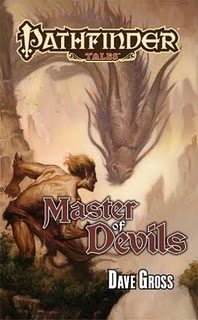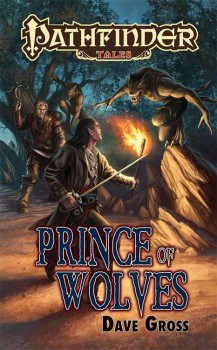Black Gate Interviews Dave Gross, Part One
 Author Dave Gross is perhaps best known for his Forgotten Realms novels such as Black Wolf and Lord of Stormweather. He has also worked as an editor of several gaming publications, including the one-and-only Dragon Magazine, and has most recently become one of the core authors for Paizo’s new Pathfinder Tales line of fiction. I recently had a chance to talk to Dave about his writing, and about his newest Pathfinder novel, Master of Devils.
Author Dave Gross is perhaps best known for his Forgotten Realms novels such as Black Wolf and Lord of Stormweather. He has also worked as an editor of several gaming publications, including the one-and-only Dragon Magazine, and has most recently become one of the core authors for Paizo’s new Pathfinder Tales line of fiction. I recently had a chance to talk to Dave about his writing, and about his newest Pathfinder novel, Master of Devils.
A Conversation with Dave Gross
Before things get too tangential, Dave, I’d like to ask you about your latest Radovan and Jeggare novel for Pathfinder, Master of Devils. For readers perhaps unfamiliar with Pathfinder, how would you describe the world of Golarion, and the story of Master of Devils in particular?
Golarion is a big, varied world. While many of its countries are intentional reflections of real-world places (Ustalav draws on Eastern Europe, while Osirion is a fantasy version of Egypt), others are complete fantasy inventions with little or no connection to historical sources (The Worldwound, Numeria, or Nex). That combination of the familiar and strange is one of the things that draws me to the setting. It lets you pull details out of real-world cultures and history while allowing plenty of freedom for invention and extrapolation from other fantasy tropes.
The protagonists I introduced in Prince of Wolves come from an area of Golarion’s Inner Sea region that is roughly analogous to Earth’s Southern Europe. Master of Devils takes place in Tian Xia, Golarion’s equivalent of East Asia. Since the journey takes Radovan and the Count completely out of their element, they must learn how to survive in this unfamiliar land at the same time as the readers discover it. Count Jeggare is a scholarly sort who’s read and heard much about the place, but he’s never actually experienced it. Radovan is a complete fish out of water, having left the country of his birth for the first time only a few months earlier. The third progatonist … well, let’s just say the third POV character has a completely different perspective than the others. My hope is that readers who might not otherwise snap up an Asian-based sword & sorcery novel will find Master of Devils an easy and fun journey into the distant lands of Tian Xia.
 Pathfinder’s Tian Xia seems pretty far ‘off the beaten track,’ what would you say were the challenges and opportunities this setting provided you in Master of Devils?
Pathfinder’s Tian Xia seems pretty far ‘off the beaten track,’ what would you say were the challenges and opportunities this setting provided you in Master of Devils?
The worst thing about writing Master of Devils was that the game developers hadn’t written the campaign material and wouldn’t get to it until after the novel was due. Thus, there was virtually no Golarion-related source material to build upon.
That was also the best thing.
While I’m not (yet) one of the Golarion experts, at least not the way I was a Faerûn expert when I was writing for the Forgotten Realms, over the past couple of years I’ve developed a feeling for the place. I also know that my editor, James Sutter, will steer me back on course if he sees something way out of order in my outline. So my first thought was that, while I adore history, my favorite depiction of Asian fantasy, and the one that seems most in keeping with the tone and atmosphere of Golarion, comes from Chinese kung fu movies.
In this case I use the “kung fu” to include wuxia films, martial arts films, war epics, ghost stories, and full-throttle fantasy films with magical duels between sorcerers and witches. In many ways, Asian filmmakers have dominated the fantasy genre for decades. My pitch for the novel that became Master of Devils was “Radovan & the Count vs. Every Kung Fu Movie Ever.”
Of course actually doing that would be impossible, but I’m surprised at how many of the dozens and dozens of films I watched or re-watched for inspiration managed to slip in some reflection of themselves. Kung fu fans will recognize many familiar character types, and perhaps even one famous character from legend.
At the same time, I didn’t want to throw fantasy readers unfamiliar with the genre into the deep end. That’s where Radovan and the Count help me out. Radovan in particular finds the place strange and learns a lot of lessons the hard way. Count Jeggare, on the other hand, has certain advantages of breeding and education, but he too finds he has much to learn–once again, often the hard way. Having characters who need to adjust their worldviews in order to understand this unfamiliar land provided a wonderful vehicle for introducing it to the readers.
In short, the challenge was only to do the best possible job, and the opportunity was to write a big fat love letter to a film genre I love–while still telling a story that could only belong to Radovan and the Count.
It sounds as if you had more latitude with Master of Devils than one would typically expect from writing in another world. What has been your experience of shared world fiction in general, and your Forgotten Realms and Pathfinder novels in particular? Is having ground rules in place liberating, or do you find yourself sometimes unable to do things as you had intended?
James Sutter loads as many “nos” into the pitch process as possible, thus sparing his writers unpleasant surprises later. I usually get a few more in the outline stage, and virtually none by the time a manuscript comes through. I appreciate that approach very much.
Despite my Master of Devils experience, Paizo exerts much more setting control over the fiction than I experienced at TSR and Wizards of the Coast. The reason for that disparity might be that I knew the Realms setting better than the book editors did, since I’d been playing from day one. That’s not true of Golarion, which I began playing a few years after its launch. At the rate Paizo produces new setting material, I might never catch up!
But to answer your last question more directly, as a rule I love restrictions. I’m the nerd who wrote sonnets instead of free verse in poetry class. Also, I like playing tennis with a net.
 In terms of gaming mechanics — ie. stats, spells, skills, abilities, feats, all that good stuff — would you say you have a strict or somewhat freer approach when making sure your fiction toes the line as set out in the books? Ever stat out your characters to see what they’d be capable of in game terms?
In terms of gaming mechanics — ie. stats, spells, skills, abilities, feats, all that good stuff — would you say you have a strict or somewhat freer approach when making sure your fiction toes the line as set out in the books? Ever stat out your characters to see what they’d be capable of in game terms?
When I first imagine the story, I try not to think of game mechanics except in those instances when a particular event or item is crucial to a plot point. Even though it’s a fantasy setting, I try to approach those descriptions in a realistic fashion. For example, in the serial fiction in the upcoming Jade Regent Adventure Path, Radovan gets to show off some of his burglary skills. A little research, and I was better armed to describe the tools and procedures he’d need to get the job done.
When describing a magical fight, I pause to stat out a character sheet (thank you, Hero Labs). Sometimes I fudge a bit. If I imagine a spell effect–say, one that animates bolts of silk to grasp and strike a foe–I think more about whether it’s about the right power level than whether there’s a rule for it. To be honest, the main thing I’m thinking is, “Does this suit the character, and is it cool?” Sometimes I deliberately introduce new types of magic when it serves the story, but I don’t give much thought to the rules it would need. It’s a bit of a thrill when a designer later picks up on those ideas and codifies them for the game, as a few have done for Prince of Wolves.
Next week in part two of our interview Dave talks about his early influences, how he broke into the gaming industry, and what he’s working on now.
______________
DAVE GROSS is the author of 2 ½ of the Pathfinder Tales novels, Prince of Wolves, Elaine Cunningham’s Winter Witch, and Master of Devils. In past he’s had honest work as a technical writer, an English teacher, and a magazine editor. You can find him on Facebook, Twitter @frabjousdave, and Blogspot.
BILL WARD is a genre writer, editor, and blogger wanted across the Outer Colonies for crimes against the written word. His fiction has appeared in numerous magazines and anthologies, as well as gaming supplements and websites. He is a Contributing Editor and reviewer for Black Gate Magazine, and 423rd in line for the throne of Lost Lemuria. Read more at BILL’s blog, DEEP DOWN GENRE HOUND.
[…] [via Scott A. Cupp]Adventures in SciFi Publishing interviews Rachel Cain.Black Gate interviews Dave Gross (Part One).Literary Musings interviews Mark Lawrence.Suvudu has video interviews with Robert […]
[…] week in part one of our interview Black Gate sat down with Forgotten Realms and Pathfinder author Dave Gross to talk about writing, […]
Interesting interview.
Good to see another admirer of Hong Kong fantasy movies!
[…] has quickly distinguished himself as the go-to guy for Pathfinder fiction (be sure to check out Black Gate’s interview with him), having written two novels and co-written another, as well as having penned numerous Pathfinder […]